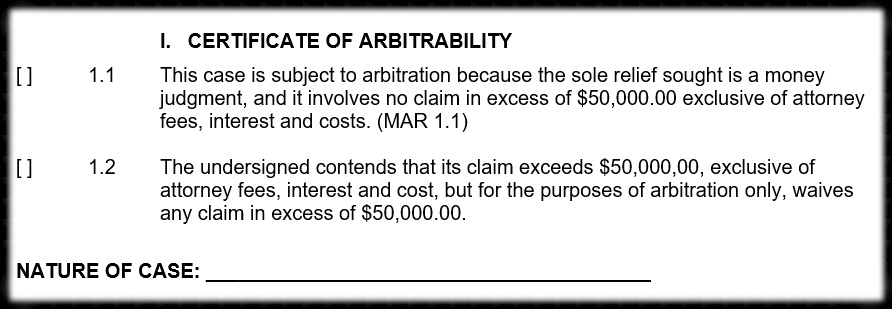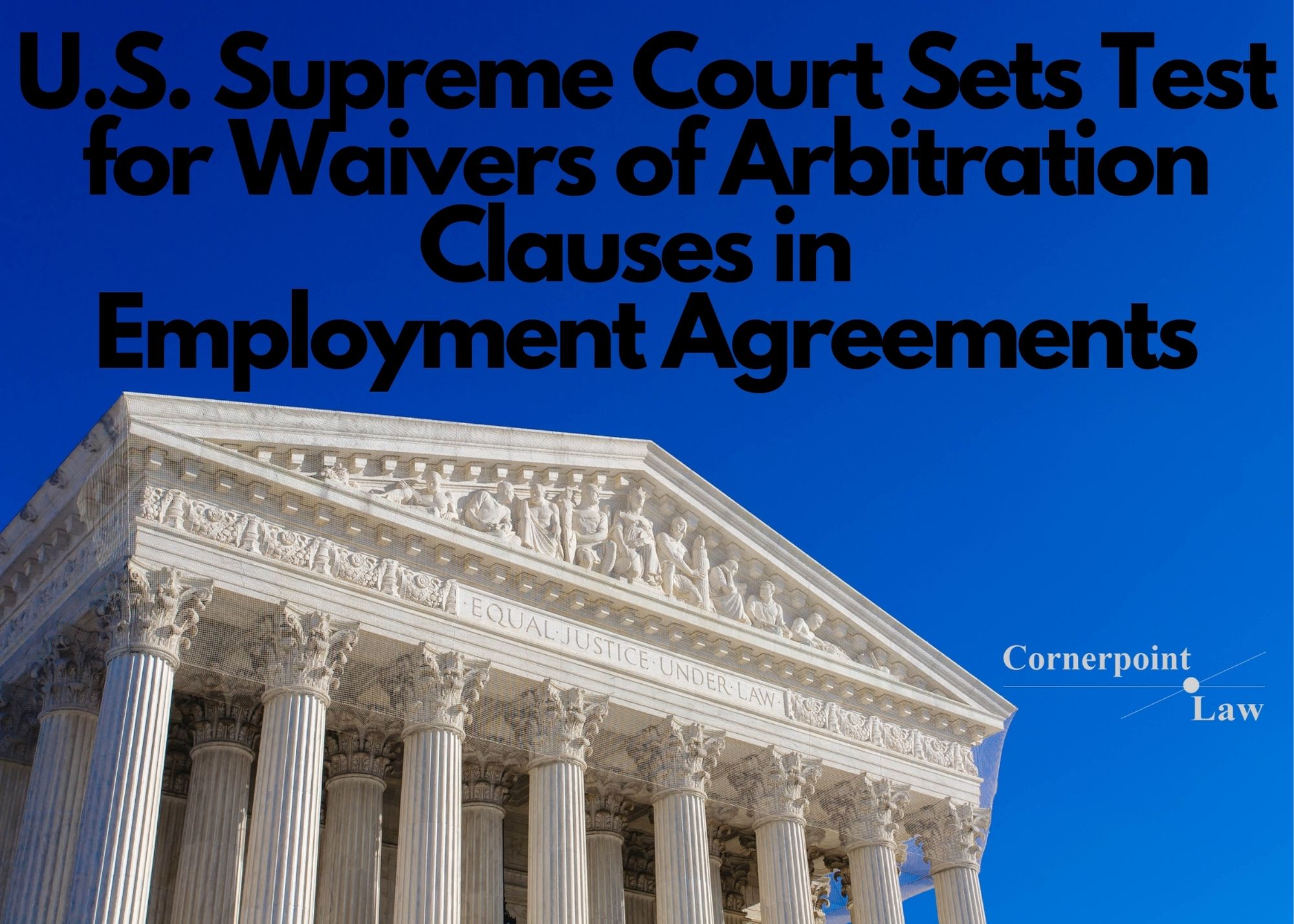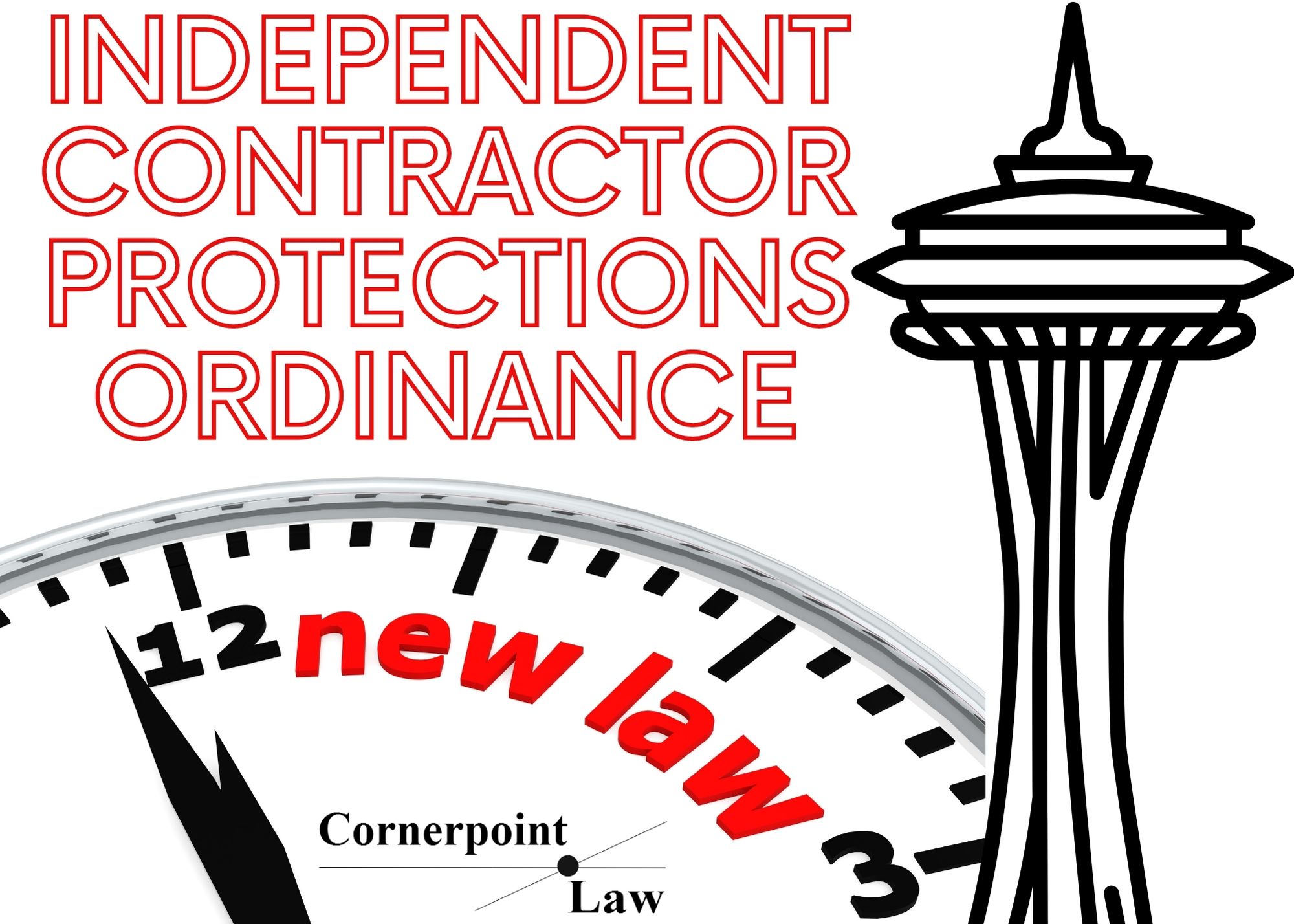(Mandatory) Civil Arbitration: No Arbitration Agreement Necessary
March 30, 2018
Unauthorized use and/or duplication of blogposts without express and written permission is strictly prohibited. Excerpts and links may be used, provided that full and clear credit is given, and with appropriate and specific direction to the original content.
The author of this post can be reached by phone at 206-693-2718 or by email.
Binding Arbitration vs. RCW Ch. 7.06 Civil Arbitration (f/k/a Mandatory Arbitration)
By Stacia Hofmann
On February 22, 2018, I published a blogpost about the paperwork that is required to start a Washington lawsuit. After filing these initial pleadings, are the plaintiff and defendant ready to jump into the thicket of civil court rules, judges, and courtrooms?
Possibly not. Washington Superior Court litigants will sometimes find their cases diverted to an alternative venue called arbitration. But if there is no arbitration agreement between the parties, how can this possibly be? The answer is legislatively mandated arbitration.
I’ve Heard of Arbitration. What Is It?
 The purpose of arbitration is to resolve disputes without utilizing court resources and proceedings, although arbitration is still an adversarial process. In civil court, the parties bring motions and present evidence and arguments in open (public) court. The case is heard by a judge and, during a trial, usually a jury. On the other hand, in arbitration, the parties present their motions, evidence, and arguments privately. The parties appear at closed hearings before an arbitrator or a panel of arbitrators. Like a judge or jury, the arbitrator or arbitration panel is ultimately responsible for reviewing the evidence and law and issuing a decision or award.
The purpose of arbitration is to resolve disputes without utilizing court resources and proceedings, although arbitration is still an adversarial process. In civil court, the parties bring motions and present evidence and arguments in open (public) court. The case is heard by a judge and, during a trial, usually a jury. On the other hand, in arbitration, the parties present their motions, evidence, and arguments privately. The parties appear at closed hearings before an arbitrator or a panel of arbitrators. Like a judge or jury, the arbitrator or arbitration panel is ultimately responsible for reviewing the evidence and law and issuing a decision or award.
There are Different Types of Arbitration
In Washington, there are two major categories of arbitration. Although they share some similarities, they are distinct in incredibly meaningful ways.
:arrow: Binding arbitration arises from a private agreement to arbitrate and is generally allowed under both Washington and federal statutes.
:arrow: Mandatory civil arbitration is required by Washington statute, RCW Ch. 7.06., and state and local court rules. On March 13, Governor Inslee signed a bill, overwhelmingly passed by the Legislature, that makes changes to the existing mandatory arbitration statute. The most important amendment doubles the potential maximum value, from $50,000 to $100,000, for cases subject to arbitration. The changes are effective for cases filed after September 1, 2018.
(The new law also removes the word “mandatory” from the statute. It will certainly take me some time to adjust to the name change, and I will continue to use “mandatory” to distinguish from binding arbitration in this post. Both types of arbitration are discussed in more detail below.)
A Contract for Binding Arbitration: A Pre-Loss Risk Management Technique
Arbitration clauses can be found in consumer, business, employment, and various other types of contracts in virtually every industry. Indeed, chances are you’ve agreed to binding arbitration at some point in your life. These agreements call for arbitration in the event of a future dispute between the parties, with the decision of the arbitrator or panel of arbitrators being final.
Binding arbitration helps keep disputes out of the court system, so these agreements are one of the most widely used risk management techniques. Arbitration can be quicker and less formal than court. Furthermore, binding arbitration offers privacy controls not found in open court, and also allows the parties to have significant say in the selection of the arbitrator(s).
 However, for the most part, parties to a binding arbitration agreement lose the ability to appeal an erroneous arbitration decision. They also lose the ability to present their case to a jury. Appeals and juries are fundamental building blocks of the American civil court system, but their value to any given litigant is subjective.
However, for the most part, parties to a binding arbitration agreement lose the ability to appeal an erroneous arbitration decision. They also lose the ability to present their case to a jury. Appeals and juries are fundamental building blocks of the American civil court system, but their value to any given litigant is subjective.
Additionally, because a case in binding arbitration should ideally be decided not only sooner than a court case, but also with less attorney time, a business might find that it saves in attorneys’ fees and thus overall costs. But that’s not always the case, as filing fees can be higher in binding arbitration than in court, and private arbitrators charge the parties for their time, whereas judges and juries do not.
So, in some situations, binding arbitration may be advantageous. Other times, the venue may be unfavorable. And, whether a binding arbitration agreement is enforceable is the subject of frequent litigation: as previously discussed on this blog, arbitration requires procedural and substantive fairness.
Because the Law Says So: RCW Ch. 7.06 Civil Arbitration f/k/a Mandatory Arbitration
In order to relieve the congestion of the Washington Superior Courts, certain civil lawsuits are required by law to go to arbitration — even if the parties have no agreement to arbitrate. RCW 7.06.010 et seq. It does not particularly matter what the civil case is about. Breach of contract, personal injury, property damage, intentional torts, and other Superior Court claims solely seeking money damages are fair game for mandatory civil arbitration.

For the case to be subject to mandatory civil arbitration, each party to the lawsuit must be seeking $50,000 in damages or less (exclusive of claims for attorneys’ fees, costs, and interest). That will change on September 1, 2018, when the new law will go into effect and each county’s judges may vote to raise the ceiling to $100,000 (which I suspect they will – at least in King and Pierce counties).
Unique Characteristics of Mandatory Civil Arbitration
Mandatory civil arbitration, like binding arbitration, is adversarial and involves the presentation of evidence and arguments to an arbitrator. But there are significant differences.
- Limited Discovery and Relaxed Rules of Evidence. The rules for civil procedure and evidence are even more informal in mandatory civil arbitration than in binding arbitration. There are pretty severe limits on each party’s ability to investigate the other party’s evidence (called “discovery”) and on when the arbitration hearing should occur. Witnesses can testify by phone, or by sworn written statements, instead of appearing in person.
- Little Say in Arbitrator Selection. Usually, but not always, arbitrators in binding arbitration devote a significant amount of their time to serving as mediators and arbitrators. Not necessarily so with mandatory civil arbitrators, the majority of whom, including myself, focus most of our time on client representation and advocacy. Choice is limited: unless the parties agree to an arbitrator, each party may reject up to two arbitrators on a very short list of names provided by the court, and then the court appoints one of the arbitrators that has not been rejected.
- Low Arbitration Costs. Unlike binding arbitration, parties in mandatory civil arbitration do not have to pay the arbitrator to review materials and hold the arbitration hearing. As the mandatory arbitration program is a joint effort by the state and county, it follows that the state and county pay for the arbitrator’s time. The plaintiff pays an arbitration filing fee to the court, but the process is drastically cheaper than binding arbitration or a courtroom trial.
- Mandatory Civil Arbitration is Not Binding, but Appealing Has Drawbacks. A mandatory civil arbitration award can be appealed back to a judge and jury through a formal request for trial de novo. However, if the appealing party does not subsequently achieve a better monetary result, then the appealing party has to pay the other party’s costs and attorneys’ fees in going through the appeal process. This expensive penalty usually persuades litigants to appeal only after thoughtful consideration. How to calculate an improved result has been the subject of extensive litigation, and the process and timeline for filing a request for trial de novo are extremely strict.
- Limited Privacy. If the arbitration is not appealed back to open court, evidence that is presented in mandatory civil arbitration may remain private; however, because mandatory civil arbitration cannot begin without filing a lawsuit, and because the award may be appealed, mandatory civil arbitration offers less privacy protection than binding arbitration.
Conclusion
Depending on the situation, arbitration can be an incredibly useful tool for quicker, more efficient, and more effective dispute resolution. But, if a litigant desires the benefits of a judge and jury, open court, and established court formalities, arbitration can be a setback.
Now that the ceiling on mandatory civil arbitration has been considerably raised, more Washington cases will be subject to mandatory civil arbitration than ever before. While no venue is truly perfect, and crystal balls are out of the question, dispute resolution decisions are not merely theoretical. Businesses should closely evaluate their potential risks and exposures when considering the pros and cons of binding arbitration, mandatory civil arbitration, and Washington’s various court venues.
This blog is for informational purposes only and is not guaranteed to be correct, complete, or current. The statements on this blog are not intended to be legal advice, should not be relied upon as legal advice, and do not create an attorney-client relationship. If you have a legal question, have filed or are considering filing a lawsuit, have been sued, or have been charged with a crime, you should consult an attorney. Furthermore, statements within original blogpost articles constitute Stacia Hofmann’s opinion, and should not be construed as the opinion of any other person. Judges and other attorneys may disagree with her opinion, and laws change frequently. Neither Stacia Hofmann nor Cornerpoint Law is responsible for the content of any comments posted by visitors. Responsibility for the content of comments belongs to the commenter alone.





Simple question: In a voluntary CR2A mediation tied to a civil lawsuit, can the mediator become the arbitrator if one party feels the mediation was not properly done? That’s like putting the fox in charge of the chicken coup.
Thank you.
P. Tomlin
I have seen CR 2A agreements include dispute resolution procedures whereby the settling parties agree that the mediator will act as an arbitrator in the event of a request to enforce the settlement, but I don’t think I have never seen a CR 2A agreement whereby the mediator will act as arbitrator on a mediation procedural issue like mediator bias, confidentiality, etc.